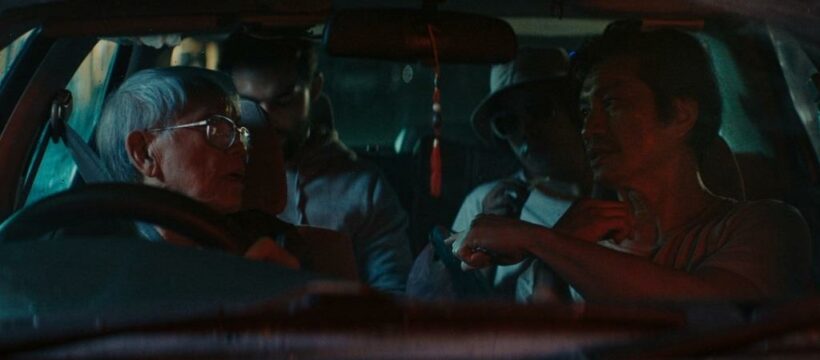The title “The Accidental Getaway Driver” says it all: A down-on-his-luck driver picks up felons in his vehicle and unwittingly gets mixed up in their criminal acts. This “Collateral”-esque proposition propels renowned music video director Sing J. Lee’s minor-key and frustratingly one-note crime-drama, inspired by the true story of a Southern California driver of Vietnamese descent held hostage by three Orange County prison runaways — an incident told in a 2017 GQ article by Paul Kix.
The premise immediately screams “cinematic thriller,” and Lee’s polished, neo-noir-adjacent nighttime sequences (captured stylishly by DP Michael Cambio Fernandez with lush neon colors and deep contrasting blacks) does right by the idea in the visual department. Unfortunately, the script — co-written by Lee and Christopher Chen — leaves a lot to be desired, squandering the old-school appeal of the true-crime drama for a dull and overlong mood piece in which nothing much happens and no real sense of danger ever registers.
It all starts promisingly enough. Octogenarian driver Long (Hiệp Trần Nghĩa) answers a lucrative call that he reluctantly accepts and finds a gun pointed to his head before he can understand what’s going on. The main felon in action is Tây, played by the ever-magnetic Dustin Nguyen, whose charismatic and intricate performance is consistently the film’s most interesting aspect. That the character of Tây, a Vietnamese immigrant like Long, swiftly steals the film’s focus comes as a surprise on the heels of Lee’s misleading setup — whereby Long is observed in his modest apartment late one night before heading to a soulless supermarket upon noticing his empty fridge.
This casual intro to Long economically telegraphs the old man’s loneliness, gesturing towards a layered character study. But the film doesn’t give Nghĩa — in a mostly wordless performance — much to do beyond observing events around him in silence and infrequently responding to the convicts’ disputes in a cool, level-headed manner. There is only so much insight to be gathered from long stretches of quiet, and occasional, clichéd flashback-style visions of Long’s challenging youth, and the family from which he’s long been estranged. For a character held hostage at gunpoint, nothing too risky really happens to Long, not even when he asks a motel receptionist for help, in a scene that comically fizzles before the brief tension we detect amounts to anything.
Tây is an intriguing enough character, with psychological demons of his own and relatable anxieties as an immigrant fearing deportation. His more vaguely developed fellow outlaws, however, are shortchanged. As the dangerous mastermind of the operation, hotheaded Aden (Dali Benssalah) does little more than deliver furious, amateur-hour verbal explosions — not helped by Benssalah’s self-conscious performance, a far cry from his impressive work in “Athena.” Phi Vũ’s Eddie, on the other hand, gets completely sidelined as a volatile and directionless twentysomething. We don’t sense the stakes amid the quartet at all; instead, we watch them in tiresome scenes of waiting around, at one point passing time by targeting an empty glass with sunflower seeds. If this supposedly charming interlude is meant to illuminate just how time slows under such pressure, it’s safe to call it a success.
There’s a hint of insight in the father-son-like dynamic that grows between Long and Tây, as the two men from different generations increasingly notice how their concerns run parallel to one another. It’s a poignant enough observation botched by trite, on-the-nose dialogue. (“Can I call you father?” Tây even asks.) Still, there could have been a better movie here if Lee and Chen had either departed more from the true story, cutting Aden and Eddie for a leaner and more focused narrative, or given them some dimension beyond punchlines. As it is, the escalating grudges between the three fugitives build up to a shakily edited sequence on a beach: The waves sure look dramatic enough, but it remains a mystery how and why they end up fighting waist-deep in the water.
There are poignant touches throughout “The Accidental Getaway Driver,” like the TV coverage we occasionally see with the fugitives’ families humanizing their loved ones in the eyes of the public. Yet as this sluggish film drags towards its schematic destination, you can’t help but impatiently ask, “Are we there yet?”
Read More About:
Source: Read Full Article
